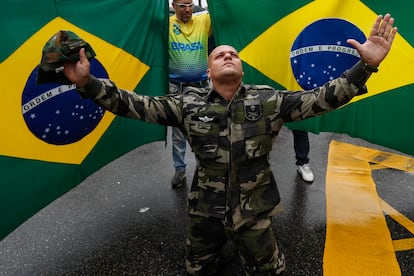New Brazilian docuseries explores the rise of right-wing extremism
Streaming platform Globoplay scrambled to update ‘Extremistas.br’ after the assault on Brasilia’s government buildings on the eve of the premiere


On January 8, Brazilian documentary filmmaker Caio Cavechini was putting the finishing touches on his new docuseries Extremistas.br, set to premiere the following week on Globoplay, Brazil’s largest streaming service. Suddenly, his phone was flooded with images of hundreds of supporters of former president Jair Bolsonaro climbing the ramp of the National Congress building in Brasília. The flag-waving “Bolsonaristas” were easily recognizable by the national soccer team jerseys they wore. “I admit my first reaction was disbelief,” said Cavechini, “even though I had just been filming in the Bolsonarista camps and saw how they emptied out.” For almost two years, he and his team had immersed themselves patiently and discreetly in the most radical elements of the pro-Bolsonaro world – they saw the warning signs.
Cavechini assumed that security forces would stop the rioters, but instead, Brazil’s democracy suffered its most serious attack in decades. The docuseries premiere was in 72 hours, and now every episode had to be updated with the latest events. It was “one of the most severe revolts against democracy in our history, and we documented how it was conceived,” Cavechini told us.
Extremistas.br was one of Globoplay’s submissions in the 2023 Berlin International Film Festival. It’s original programming from Grupo Globo, the largest media group in Brazil and Latin America. One of the series’ protagonists is Rosangela Peçanha, an entrepreneur from Niteroi, a city across the bay from Rio de Janeiro. In a matter-of-fact voice, she tells the cameras, “Communism is spreading – I’m going to war.” Later in the series, she says, “If we don’t step up, we will lose this war.” This is the type of bellicose rhetoric that has become increasingly normal among the most radical followers of former president Jair Bolsonaro.

Cavechini compiled dozens of interviews and over 1,000 hours of footage into eight episodes that delve into the complex machinery feeding political extremism in Brazil. Extremistas.br aims to provide insights into the phenomena and events most people only see in fleeting daily news reports.
The protagonists of the series illustrate the broad diversity of these political radicals. The commissioner and social media influencer who staunchly defends the right to bear arms; a young councilman and evangelical pastor from the northeast who studied dentistry; an elderly journalist; and Rosangela Peçanha, the entrepreneur. They live all over the country, some in Bolsonaro strongholds and others in long-time Lula bastions. These extremists also represent different elements of political radicalization – morality and religious manipulation, fake news dissemination, online smear campaigns, the right to bear arms, and more.
Fear and urgency
Cavechini said the docuseries is “an immersion in the environment that breeds this violence (the assault in Brasilia). It feeds on hate speech, the social media business model, foreign influences, and fear and urgency. It has become a permanent state of mobilization because there is a sense that our very lives are at risk – right now.” Cavechini also directed Marielle, the Globoplay documentary about a crime that shocked Brazil – the murder of leftist Rio councilor Marielle Franco five years ago.
Once the assault in Brasilia began, Cavechini’s team rushed to record the reactions of the docuseries’ main characters, who were frantically posting messages of support on social media. “We consulted with Globoplay and decided to change the premiere dates,” said Cavechini. Instead of releasing all episodes simultaneously, they were spread over 15 days to include material from the Brasilia riots and its aftermath.
Extremistas.br follows the Bolsonaro supporters gearing up for the president’s reelection campaign and protests against Supreme Court judges months before the election. It went into the camps they erected on city streets to deny the election results and call for a coup d’état. It interviewed experts and focused on how disinformation is such an effective breeding ground for radicalization.
Jair Bolsonaro garnered 58 million votes in the 2022 presidential election, two million less than Luiz Inácio Lula da Silva. Lula’s inaugural celebration took place in the same Brasilia square that would be overrun by Bolsonarita rioters a few days later. The fear of a Brazilian-style January 6 assault on the US Capitol had percolated for months, but the riot still caught almost everyone off guard. The entire country was dumbstruck by how quickly the nation’s democratic institutions were overrun.
Philosophy professor Marcos Noble tells the camera that the most extreme Bolsonaritas are a small minority. “Only 15% of those voters favor authoritarianism,” he said. Those are the people the Bolsonarista movement counted on to “create the right conditions for a coup.”
Cavechini says that after almost two years of research, he has concluded that “there is no single profile of an extremist, which is frightening.” He describes Brazilian extremists as a diverse group that only shares “an immersion in an ecosystem of disinformation and complete disinterest in investigating other sources, such as journalism and science.”
Sign up for our weekly newsletter to get more English-language news coverage from EL PAÍS USA Edition
Tu suscripción se está usando en otro dispositivo
¿Quieres añadir otro usuario a tu suscripción?
Si continúas leyendo en este dispositivo, no se podrá leer en el otro.
FlechaTu suscripción se está usando en otro dispositivo y solo puedes acceder a EL PAÍS desde un dispositivo a la vez.
Si quieres compartir tu cuenta, cambia tu suscripción a la modalidad Premium, así podrás añadir otro usuario. Cada uno accederá con su propia cuenta de email, lo que os permitirá personalizar vuestra experiencia en EL PAÍS.
¿Tienes una suscripción de empresa? Accede aquí para contratar más cuentas.
En el caso de no saber quién está usando tu cuenta, te recomendamos cambiar tu contraseña aquí.
Si decides continuar compartiendo tu cuenta, este mensaje se mostrará en tu dispositivo y en el de la otra persona que está usando tu cuenta de forma indefinida, afectando a tu experiencia de lectura. Puedes consultar aquí los términos y condiciones de la suscripción digital.








































